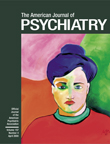Neurological Signs and the Heterogeneity of Schizophrenia
Abstract
OBJECTIVE: More than 20 studies of schizophrenia have found a three-factor model of symptom complexes or syndromes consisting of hallucinations/delusions, disorganization of thought and behavior, and negative symptoms. Several lines of evidence suggest that these syndromes relate to neurobiological differences. We examined the relationship of these three syndromes to neurological signs. METHOD: The relationships among the subscales of the Neurological Evaluation Scale and hallucinations/delusions, disorganization, and the deficit syndrome were examined in 83 clinically stable outpatients with schizophrenia. Patients with the deficit syndrome have enduring, idiopathic (or primary) negative symptoms. RESULTS: Each of the three syndromes had a distinctive pattern of relationships to neurological signs. Disorganization was significantly related to the total score on the Neurological Evaluation Scale, to sensory integration, and to the sequencing of complex motor acts. The deficit syndrome was significantly related to sensory integration only. Neither hallucinations/delusions nor a continuous measure of negative symptoms derived from the Brief Psychiatric Rating Scale (that measured both primary and secondary negative symptoms, as well as enduring and transient symptoms) was related to any of the Neurological Evaluation Scale subscales or total score. Drug treatment was not related to neurological impairment. CONCLUSIONS: The results further support the neurobiological significance of the three clinical syndromes of schizophrenia. Ratings on a scale measuring negative symptoms appear to be less sensitive to neurobiological correlates than is the categorization of the presence or absence of the deficit syndrome.



